 Why I am Saying that the Church does not Preach
Why I am Saying that the Church does not Preach
I was born in 1945 so they call me an ‘early baby boomer’. (1945 to 1960). I was writing a letter from my generation to Millennials, also known as Generation Y (born 1981 to 1996), but all, the intervening generation as well would be interested.
Things were very different for those of us who grew up immediately after WW2, easier times I would say, and that affected our spiritual development. Now as we are getting older we have to see many wasted years – reminding us of that scripture: ‘Tell ye your children of it, and let your children tell their children, and their children another generation. That which the palmerworm hath left hath the locust eaten; and that which the locust hath left hath the cankerworm eaten; and that which the cankerworm hath left hath the caterpiller eaten’ (Joel 1:3-4). God in His mercy goes on, ‘And I will restore to you the years that the locust hath eaten, the cankerworm, and the caterpiller, and the palmerworm, my great army which I sent among you. And ye shall eat in plenty, and be satisfied, and praise the name of the LORD your God’ (ch 2:15-26). So, we have to redeem the time because the days are evil (see Eph 5:16). That applies to my generation, and to all, including those left of the pre-war generations.
The world is evil now – it always has been, but there are certain pressures unique to the 21st century. On the positive side we are generally better off, and benefit from modern communications, technology and ease of travel. When I was young mobile phones were science fiction, and the world-wide-web had not even been conceived. We had our bikes and a lot more freedom, which I think made us happier and healthier.
We admire our Younger Brethren and their Testimony
So:
1· Peer pressure was nothing like what it is now. You did not have to have the latest gizmo, and your status was not available for the world to see 24/7 on Facebook or Instagram.
2· Social liberal attitudes had not developed: ‘Gay’ meant ‘living merrily’ (not necessarily happily), divorce and abortion were frowned upon, if not illegal, and people would be horrified by the idea of selecting one’s sex (I don’t use the word ‘gender’). Whilst you could be mocked for standing for what was right as a Christian, there was not that militant secularism.
3· People regarded evolution as a theory not a fact, though most accepted it.
4· You could get a good job without having to go to university (You still had to study) – and if you did go to uni, there were no tuition fees and you could get a grant towards living expenses
5· It was easier to get on the property ladder.
I could go on.
Under these circumstances, I admire the way that many young brothers and sisters are applying themselves to the Lord’s things and studying the scriptures. I hear of meet-ups for prayer, study and evangelisation. In the break at meetings I have seen (and sometimes entered) into discussion groups on spiritual matters and I witnessed a group of young sisters with their study bibles out.
Younger people in many places are enthusiastic – and for the things of the Lord they should be. But so often the enthusiasm is ‘church-centred’ not ‘Christ centred’.
At a recent meeting the subject was our preaching the glad tidings. What was emphasised was that preaching was an individual, not an assembly matter. I heard an aside remark suggesting that what we were talking about were ‘technicalities’. Sorry, I see these things as being pretty fundamental.
In the early days preaching started in the open air. Peter’s first preaching was such. Paul would go into a synagogue and preach there (if he was allowed to) – not a Christian assembly. John Wesley and others were renowned for open air preaching. His preaching was individual – because the church as an entity does not preach.
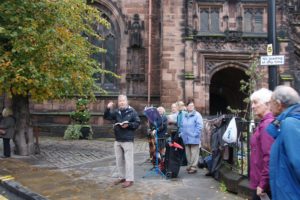 The Church and the Gospel
The Church and the Gospel
I fully understand the concerns of my younger brethren. My generation was not active enough in preaching to others. I think that we – brothers and sisters – are coming to recognise that we had gone on with a line that put the collective position, not the Lord, at the centre. We ended up smugly in a socially happy group of white middle-class Christians, content with a stack of ministry, claiming (some would even say exclusively) to represent the assembly in a broken day. If you ask me, that was pretty Laodicean. Looking back, we had probably been let down by our parents’ and grandparents’ generations when we were young. Where I was brought up, Godly influential and gifted men, whom we looked up to, tolerated the 1960’s Taylor Exclusive system. As a result we were coloured by it, even if as young people, we rebelled against it.
This was not unique to one company of Christians. Formalism and authoritarianism permeated Christendom. Well organised, successfully managed operations, be they churches or businesses, have outward success – one may be measured in ‘converts’, the other in profit. But who are the measurers and who is determining the criteria for success?
Some Preaching is like Entertanment
Alongside this, there has been a line which matches Christian service with worldly entertainment. Many Catholic and Protestant establishments put on spectacular performances and processions with wonderful form, clothing, pomp and circumstance. Elsewhere the show may be more modern and charismatic, helped by the latest technology – sound and light systems, a good band (modern music) and a church hall which is more like a theatre or music-hall than anything else. Is this to the glory of God?
So, where does that leave us? Paul, when he came to Corinth (Maybe the entertainment hub of the Mediterranean) said, ‘And I, brethren, when I came to you, came not with excellency of speech or of wisdom, declaring unto you the testimony of God. For I determined not to know any thing among you, save Jesus Christ, and him crucified. And I was with you in weakness, and in fear, and in much trembling. And my speech and my preaching was not with enticing words of man’s wisdom, but in demonstration of the Spirit and of power: that your faith should not stand in the wisdom of men, but in the power of God’ (1 Cor 2:1-5). Paul would not have been successful by worldly standards. Small wonder that sober Christians are not either.
I believe that in the early 1800’s there was a line of scripturally correct teaching which had a strong influence among evangelically-minded Christians worldwide. I have little doubt that this was a movement of the Holy Spirit similar in character to the Reformation. Brethren and other evangelicals departed from that, some institutionalising the teaching, and others taking certain aspects only. Both were wrong.
Important Truths
Here are some of the scriptural truths to which Christians were recovered:
1. The understanding that the church (ἐκκλησία/ekklésia/Strong 1577) is heavenly in origin and destiny. It is not part of the world system and is here comprising all believers. Christ is its Head (See Eph 1:22 – 2:6) – Christ has been made Head over all things to the church, and we have been made to sit in the heavenly places in Christ).
2. That the hope of the church is the coming of Christ to call us to be with Him (See 1 Thess 4:13-18, Rev 22:17)
3. That the church publicly is in ruins, having departed from the Lord and the teaching of the apostles. This was already anticipated by Paul in Acts 20:19-30, and when it had taken place, we have a path for the believer in 2 Tim 2:19-22.
Some of us who are older, and therefore more responsible, are concerned to get back to basics. Our worlds have been turned upside down. The more we look at our histories, the more we realise that we had departed from what we really knew (or sometimes misunderstood). Small wonder that we want to get back to fundamentals with the Lord’s help and the direction of the Holy Spirit.
Preaching and Teaching
Now, to get back to our subject of the relationship of the church to the preaching of the glad tidings, I need to make two things clear:
1. THE CHURCH DOES NOT TEACH!
2. THE CHURCH DOES NOT PREACH!
Of course, this is contrary to what might be accepted generally in churches who regard themselves as authoritative corporate entities. These bodies cannot be the church – the body and bride of Christ, whatever their intention, they are man-made organisations. If you look at church websites, they usually emphasise what they are in the community, and include a ‘canned’ statement of faith. What is more, they usually have a single leader – pastor, vicar or whatever, and run on human management lines. That person will have a line of teaching, partly related to his ecclesiastical hierarchy, and partly his (or her) understanding. Hence you hear people say, ‘What does your church teach about XYZ?’.
We must be thankful that many places preach Christ as the one and only Saviour for sinners. He bore our sins on the cross and shed His blood. (I trust every reader of this letter is fully in the enjoyment of the certainty of these things). You find many devout souls who love the Lord everywhere. However, they are often defective in several ways:
Some Error in Evangelical Christendom
1. Often (in Pentecostal, Adventist and Methodist) establishments there is Arminian error, for example – saved today and lost tomorrow, despite what the Lord says as to His sheep in John 10.
2. In very few cases there is no real expectation of the Lord’s coming. Many are striving to make this world a better place, with a view to the kingdom being established here (into which the Lord can come).
3. Many deny the rapture despite its being clear in 1 Thess 4.
4. Few understand that the church is heavenly in origin and destiny, typified in the sheet in Acts 11 – it came from heaven and went back. It is the body of Christ here caring for His interests.
5. There is much confusion as to the millennium, with some thinking we are there already – not the period between the first and second resurrections (see Rev 20:4-6)
The fact they are teaching and preaching different things, often not in accordance with scripture, just emphasises this.
When a company of Christians assumes – officially or unofficially – a corporate identity, it is time to leave. This may be painful, as my wife and I found in 2017. But the Lord promised a hundredfold (see Matt 19:29). We have met other Christians leaving other man-made organisations too. ‘The Lord knows those that are His’ ( 2 Tim 2:19).
Having left one company there is a temptation to look round and borrow things from elsewhere. One could say ‘Where we were, we got things wrong – elsewhere they might be right’. This is the human way. I know there are some exciting things going on in many churches, but you and your work will be truly effective if you are with the Lord individually.
I have attended several meetings recently in which the Lord has given a distinct word as to the maintenance of what has been established (the ancient landmarks) and doing things according to the due order (not like David in 2 Sam 6). We all have to take this to heart.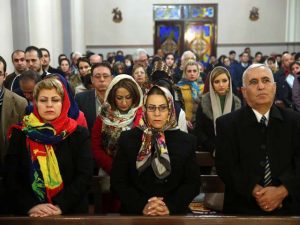
Iranian Christians – from the Joel Group
Finally, I would like to reproduce something I read a few weeks ago, concerning a group of Christians with whom, I guess no reader of A Day of Small Things enjoys practical fellowship. I get emails from the Joel Group, which I like because they give a positive view about what God is doing, in this case, in Iran. Over the years the ayatollahs have descried churches and nominal Christians have given in. The writer says, ‘The fastest-growing church in the world has taken root in one of the most unexpected and radicalized nations on earth, according to ‘Sheep Among Wolves’, an outstanding two-hour documentary about revival. The Iranian awakening is a rapidly reproducing discipleship movement that owns no property or buildings, has no central leadership, and is predominantly led by women. He goes on:
Efforts by the ayatollahs to destroy Christianity have backfired but have served to refine and purify the church. “What persecution did was destroy the churches that were only about converts,” the Iranian church leader noted. “Converts run away from persecution, but disciples are willing to die for the Lord in persecution.” Often a disciple-making movement begins the first moment someone comes into contact with an unbeliever. “Everything is founded on prayer. We find people of peace through prayer. We even find locations through prayer,” the Iranian church leader noted. “Jesus has gone faster than us. He has come in their dreams or he’s come miraculously in their lives. When we hear this, we know that Jesus has gone ahead of us.”
I can relate to this. Read it. Watch that video, or read George Thomas’s account.
Sosthenes Hoadelphos
January 2020


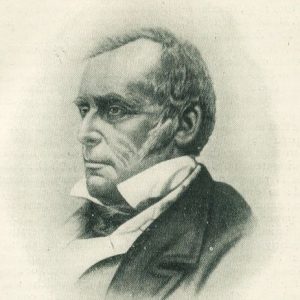 One thing I would pray for, because I love the Lord’s sheep, is that there might be shepherds. I know nothing, next to personal communion with the Lord, so blessed as the shepherds feeding the Lord’s sheep, the Lord’s flock; but it is the Lord’s flock…that changes the whole aspect of things. When it is felt to be the Lord’s flock a man has to look over, what thoughts of responsibility, what care, what zeal, what watchfulness! I do not see anything so lovely. “Lovest thou me? Feed my sheep—feed my lambs.” I know nothing like it upon earth—the care of a true-hearted shepherd, one who can bear the whole burden of grief and care of any soul and deal with God about it. I believe it is the happiest, most blessed relationship that can subsist in this world.
One thing I would pray for, because I love the Lord’s sheep, is that there might be shepherds. I know nothing, next to personal communion with the Lord, so blessed as the shepherds feeding the Lord’s sheep, the Lord’s flock; but it is the Lord’s flock…that changes the whole aspect of things. When it is felt to be the Lord’s flock a man has to look over, what thoughts of responsibility, what care, what zeal, what watchfulness! I do not see anything so lovely. “Lovest thou me? Feed my sheep—feed my lambs.” I know nothing like it upon earth—the care of a true-hearted shepherd, one who can bear the whole burden of grief and care of any soul and deal with God about it. I believe it is the happiest, most blessed relationship that can subsist in this world. …”the kingdom of heaven is like unto a merchant man, seeking goodly pearls; who, when he had found one pearl of great price, went and sold all that he had, and bought it.” (
…”the kingdom of heaven is like unto a merchant man, seeking goodly pearls; who, when he had found one pearl of great price, went and sold all that he had, and bought it.” (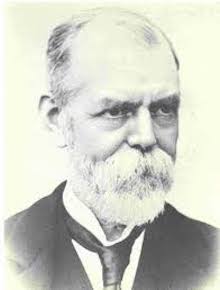
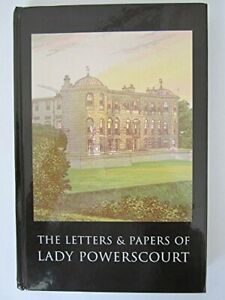 Powerscourt,
Powerscourt,